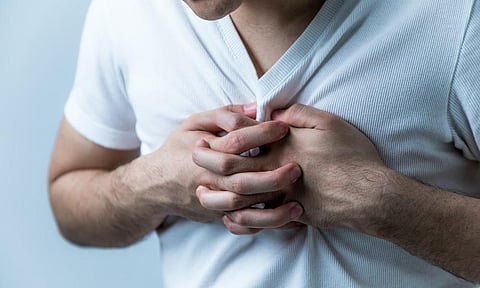

Experiencing some form of chest pain has become common these days. People experience chest pain in their own way, mostly due to disturbances in different parts of the body.
Chest pain can be an emergency or non-emergency medical condition depending on the source of pain.
With the increase in cardiovascular diseases (CVD) even among a relatively young population, especially due to changes in lifestyle in modern times, experts advise people to suspect heart attacks on the occurrence of chest pain as a measure of caution.
Causes of chest pain
The four primary reasons for chest pain are due to issues in:
- Cardiovascular systems
- Respiratory system
- Gastrointestinal system
- Musculoskeletal system/psychological issues
1. Cardiovascular systems
A majority of health emergencies are associated with problems in cardiovascular systems. Pain in the chest due to disturbances here requires immediate attention and treatment, including surgeries, angiogram and medications. The four major contributors to chest pain are:
Heart attack: The reason for heart attack, also known as myocardial infarction, is the reduction or block in blood flow to the heart due to the accumulation of fat, cholesterol and other substances.
Dr L Kiran Kumar Reddy, interventional cardiologist and HOD Onus Heart Institute said, “Pain related to the heart would be in the center and to the left part of the chest and may radiate from the jaw to the upper abdomen. The individual may feel like a weight was placed on the chest. The pain would be very intense and would continue for at least 20 minutes.”
This kind of chest pain requires an immediate angiogram and stenting.
Aortic dissection: When there is a tear in the inner layer of the main aorta, the condition is called aortic dissection. This can happen to patients with underlying conditions like high blood pressure.
“The pain would be like a stabbing in the chest and radiating to the shoulder blades. The pain is persistent and is associated with sudden difficulty in breathing,” Dr Kiran Kumar said.
This condition would mostly require emergency surgery.
Pulmonary embolism: In this condition, a blood clot develops in other parts of the body, moves to the artery in the lungs and blocks it. This can happen in one or more arteries in the lungs.
“The pain would be sharp and stabbing which increases with deep breath and coughing. There would be a sudden fall in BP. This may occur after a major surgery or if the individual has been immobile for a long time,” Dr Kiran Kumar explained.
The treatment includes administration of blood thinners and breaking the clot to prevent emergencies.
2. Respiratory problems
Besides chest pain from specific conditions in the cardiovascular system, problems in respiratory systems can also cause acute pain.
Pneumothorax: The condition of air collecting outside the lungs but within the pleural cavity leads to the compression of the lungs called pneumothorax. The functioning of the lungs would be severely affected and may even result in the lungs collapsing.
Dr Kiran Kumar added, “There could be severe sharp pain in the chest and may increase on deep breath and coughing. The patient may feel giddy and even become unconscious. This requires an intercostal tube to drain the air held around the lungs.”
Pneumonia: On rare occasions, pneumonia can also cause chest pain. This occurs due to the inflammation in the pleura, a two-layered membrane surrounding the lungs. Pleural effusion, a situation when fluids build up between the pleural membranes can cause chest pain.
“In this case, the pain is localised and is associated with fever and cough,” Dr Kiran Kumar said.
3. Gastrointestinal issues
Chest pain can occur due to gastrointestinal illness and digestive issues. Pain due to gastric problems is associated with a burning sensation in the upper abdomen while the pain can prevail for several hours.
“An individual can suffer from such pain after a heavy fatty meal, when the gap between two meals is short or when the meal was taken shortly before sleeping,” Dr Kiran Kumar added.
Such persistent issues can be due to gastroesophageal reflux disease (GERD) which requires treatment.
4. Musculoskeletal systems/psychological symptoms
The pain in the muscles, bones and tissues around the heart can cause also chest pain. The individual may feel like the heart is being squeezed and there is pressure around the chest area. “There would be local tenderness and the pain increases on pressing the area. The pain can be relieved by anti-inflammatory medications,” Dr Kiran Kumar said.
Chest pain can also be psychosomatic and can be experienced during panic attacks and anxiety.
Since the causes of chest pain are many, experts suggest treating chest pain as a heart attack or type of dysfunction in the heart and seeking immediate medical attention.